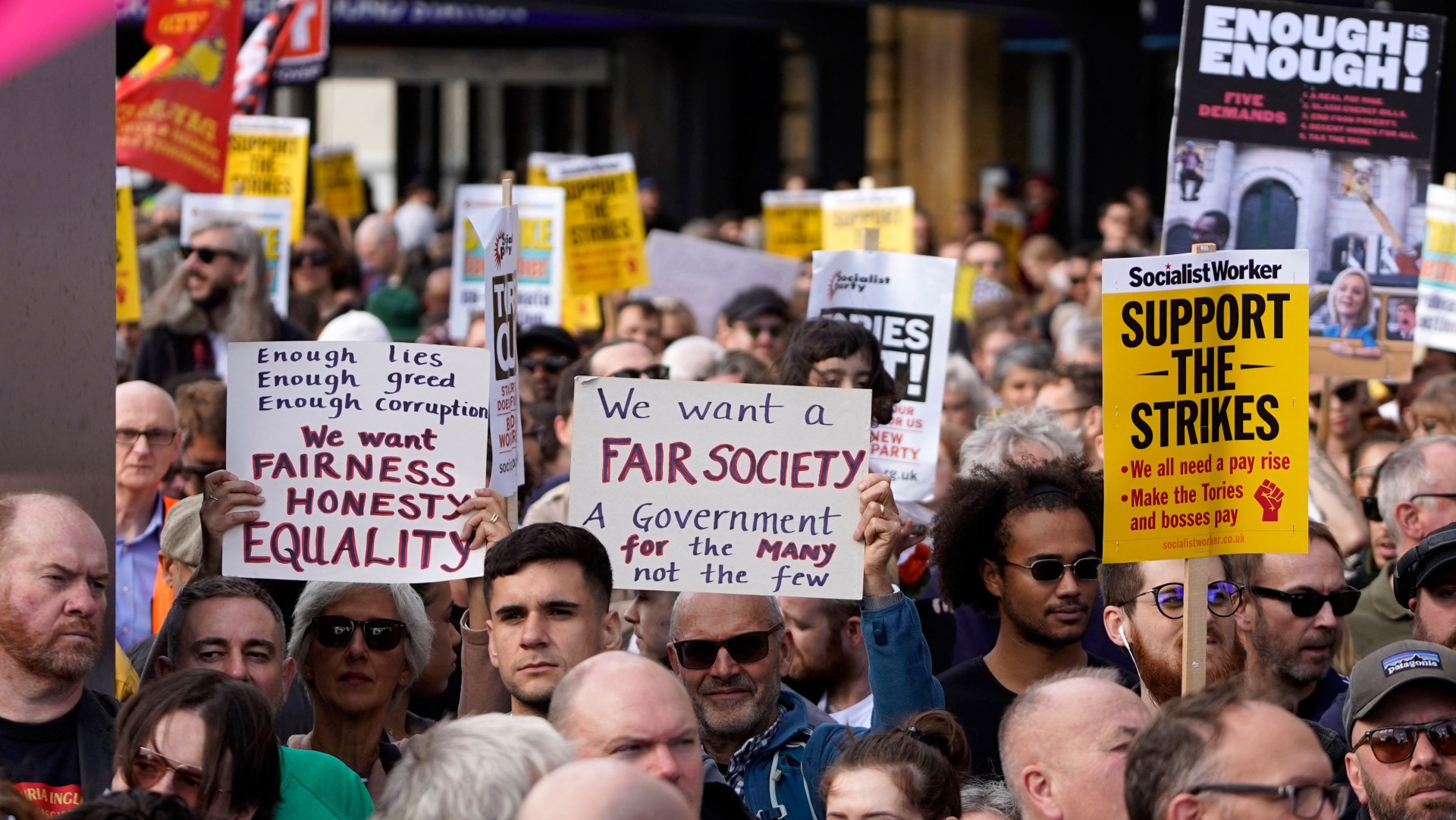Should benefits rise with inflation?
Liz Truss reportedly preparing to break predecessor’s promise as insiders warn move would be ‘politically unstainable’

A free daily email with the biggest news stories of the day – and the best features from TheWeek.com
You are now subscribed
Your newsletter sign-up was successful
Liz Truss is refusing to say whether benefits will rise in line with inflation as her government looks to make billions of pounds in savings to pay for controversial tax cuts.
Speaking at the Conservative Party Conference in Birmingham, the prime minister told the BBC that “we have to be fiscally responsible” and reduce the national debt.
Although disability benefits and carer’s allowance “must increase in line with inflation by law”, said the broadcaster, “no decision has yet been made on whether a rise will be linked to prices or wages” for working-age benefits such as Universal Credit.
The Week
Escape your echo chamber. Get the facts behind the news, plus analysis from multiple perspectives.

Sign up for The Week's Free Newsletters
From our morning news briefing to a weekly Good News Newsletter, get the best of The Week delivered directly to your inbox.
From our morning news briefing to a weekly Good News Newsletter, get the best of The Week delivered directly to your inbox.
‘New front in Tory infighting’
Speculation about Truss’s economic plans has been mounting after Treasury Secretary Chris Philp said last week that a commitment by Rishi Sunak to uprate benefits in line with inflation was “under consideration”.
Both the former chancellor and Boris Johnson vowed to increase benefit and pension payments next April in line with this September’s Consumer Prices Index measure of inflation, “which is currently 9.9%, subject to a review by the work and pensions secretary”, the BBC reported.
Raising benefits in line with wages instead could save an estimated £5bn, amid reports that government departments have been asked to set out plans for “efficiency savings”.
According to the i news site, experts have calculated that the policy shift “would amount to a cut of four percentage points and cost the average low-income working family with two children more than £1,000 a year”.
A free daily email with the biggest news stories of the day – and the best features from TheWeek.com
The possible move risks another row within the Tory party and cabinet as Truss faces unrest following the disastrous fallout from last month’s mini budget. The benefits battle “looks set to be the new front in Tory infighting”, said The Telegraph, which reported “unease at the top of government, with some cabinet ministers understood to believe that refusing to increase benefits by inflation is a ‘non-starter’”.
Former Tory leadership contender Penny Mordaunt told Times Radio this morning that increasing benefits in line with inflation “makes sense”.
“We want to make sure that people are looked after and that people can pay their bills,” the Commons leader said. We are not about trying to help people with one hand and take away with another.”
An unnamed cabinet minister told The Times that pushing ahead with a curb to benefits would be “mad” and “politically unsustainable” as households across the UK struggle with the cost of living.
But another told the paper that increasing benefits at a rate higher than wages are increasing would be “unfair”. Allies of Truss reportedly asked: “How can it be right that someone who gets up at 6am and works hard all day is seeing their pay go up by 5% or so and someone who is not working and is on benefits gets a 10% rise?”
Weighing up priorities
Despite the threat of a Tory revolt, No. 10 “is preparing to question whether it is fair for people on benefits to get inflation-linked rises while scores of workers get real-terms pay cuts”, said The Telegraph. Record-low levels of unemployment in Britain is also “leading to calls for more to be done to incentivise people to take jobs”, the paper added.
The Times reported that “some in government believe Truss’s U-turn on scrapping the 45p rate of tax will make it easier to impose real-terms cuts in benefits”.
“In an effort to mitigate a backlash,” the paper continued, “some are seeking to link any Universal Credit squeeze to the £650 cost-of-living payments being given to eight million households claiming the benefit this winter.”
But Work and Pension Secretary Chloe Smith was “thought to be resisting this line of argument and is warning against attempts to see the welfare budget as an easy source of savings”. She told the Tory conference yesterday that “protecting the most vulnerable is a vital priority for me and this government”.
The Treasury is understood not to have yet made formal suggestions” to Smith’s department, said The Times, and the minister stressed that “she would not make a decision for at least two weeks”, until the inflation data for last month has been reviewed.
-
 Political cartoons for February 19
Political cartoons for February 19Cartoons Thursday’s political cartoons include a suspicious package, a piece of the cake, and more
-
 The Gallivant: style and charm steps from Camber Sands
The Gallivant: style and charm steps from Camber SandsThe Week Recommends Nestled behind the dunes, this luxury hotel is a great place to hunker down and get cosy
-
 The President’s Cake: ‘sweet tragedy’ about a little girl on a baking mission in Iraq
The President’s Cake: ‘sweet tragedy’ about a little girl on a baking mission in IraqThe Week Recommends Charming debut from Hasan Hadi is filled with ‘vivid characters’
-
 Will Trump’s 10% credit card rate limit actually help consumers?
Will Trump’s 10% credit card rate limit actually help consumers?Today's Big Question Banks say they would pull back on credit
-
 Why is pizza in decline?
Why is pizza in decline?In the Spotlight The humble pie is getting humbler
-
 What will the US economy look like in 2026?
What will the US economy look like in 2026?Today’s Big Question Wall Street is bullish, but uncertain
-
 Is $140,000 the real poverty line?
Is $140,000 the real poverty line?Feature Financial hardship is wearing Americans down, and the break-even point for many families keeps rising
-
 Fast food is no longer affordable for low-income Americans
Fast food is no longer affordable for low-income AmericansThe explainer Cheap meals are getting farther out of reach
-
 Why has America’s economy gone K-shaped?
Why has America’s economy gone K-shaped?Today's Big Question The rich are doing well. Everybody else is scrimping.
-
 From candy to costumes, inflation is spooking consumers on Halloween this year
From candy to costumes, inflation is spooking consumers on Halloween this yearIn the Spotlight Both candy and costumes have jumped significantly in price
-
 Why are beef prices rising? And how is politics involved?
Why are beef prices rising? And how is politics involved?Today's Big Question Drought, tariffs and consumer demand all play a role